What Zuma's victory means for South Africa
- Published
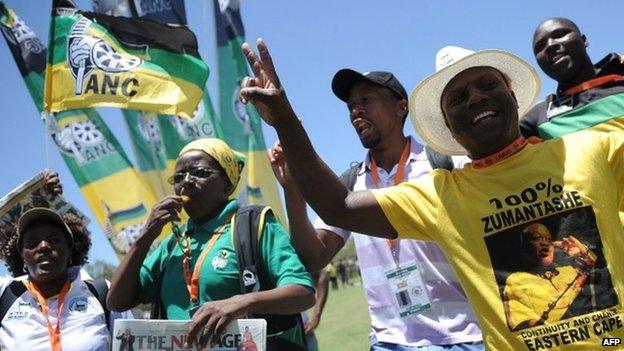
South Africa's Jacob Zuma seems to have mastered the art of survival as he secured a second-term to lead the governing African National Congress - and by extension the country, amid fierce competition and criticism.
The 70 year old has been in power since 2009 and has danced back and forth between controversy and victory during this period.
His government's handling of the gruesome Marikana wage protests, in which 34 people were killed by police, was a distant memory inside the large white tent packed with ANC delegates who celebrated Mr Zuma's victory with thunderous applause, blaring vuvuzelas and ululating.
Mr Zuma secured 2,986 votes out of the 3,977 cast - making it a decisive victory against his long-time comrade and reluctant challenger, Kgalema Motlanthe.
Thousands dressed in the party's colours of black, green and gold cheered "Zuma, Zuma", others shouted "Phinda 'Msholozi", meaning "do it again "Msholozi'" - Zuma's clan name.
Many delegates in Mangaung in Free State, where the party was founded 100 years ago, expected the president's victory but opposition parties elsewhere were shocked by the result.
They questioned how the man who is currently being investigated for alleged misuse of millions of dollars in public funds for renovating his private home in Nkandla in KwaZulu Natal, had been given the chance to lead the country once more.
Main opposition leader Helen Zille, whose party snatched one of nine provinces from the ANC in the last election, a sign of growing dissatisfaction with the governing party, said Mr Zuma's win was bad news for South Africa.
Jacob Zuma: "We can boast that we're a leader of our society"
She said it sent out a message that the party was a movement that put "powerful people" above the law.
"This is particularly clear globally, where it is just inconceivable that a president who has avoided, for three years, facing trial on over 700 counts of corruption, could be re-elected a party president."
Ms Zille was referring to a controversial multibillion dollar 1999 arms deal, which led to Mr Zuma's financial adviser, Schabir Shaik, being convicted of soliciting a bribe in 2005.
After Shaik's conviction, Mr Zuma was sacked as deputy president before being charged himself.
The charges were dropped just weeks before the 2009 election which led to Mr Zuma becoming president, the decision to drop the charges is currently under review.
'Empty promises'
But Mr Zuma's supporters see his success, despite any formal education, as a sign of hope that they too can lead successful lives - maybe not as prosperous as his but different from the oppressive life under apartheid.
To them his legal challenges and scandals are not enough to make them desert him.
"Our country is safe now from the thugs, the thieves," exclaimed one of Mr Zuma's supporters inside the packed hall.
Another, Scelo Shabalala, 55, from Mpumalanga province, said: "Zuma deserves another chance to prove himself. No one is perfect but he is trying."
But most of the ANC's rank and file in three provinces turned against Mr Zuma in the run-up to the elections and they did not want him to receive another term.
"We are disappointed with the result. I believe we will regret the choice made here by some of our comrades," said Rejoice Tau, 30, from Limpopo.
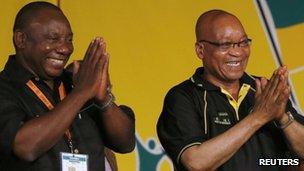
Jacob Zuma (R) and his new deputy Cyril Ramaphosa may be able to heal ANC divisions
Although Mr Zuma received overwhelming support from his home province, KwaZulu-Natal, Steven Hlatswayo was among the dissenting voices.
"Zuma is about enriching his own family and not South Africans. All he is doing is making empty promises," Mr Hlatswayo says - not convinced by the president's assurances that he is fighting corruption and improving services.
Despite the mixed views Mr Zuma seems set to win in the presidential election in 2014.
Senior political analyst Adam Habib says Mr Zuma relates to the poor - and that is partly what won him the hearts of the Mangaung delegates and millions across the country.
"Apart from Mandela, Mr Zuma is the only president who knows how to establish a rapport with the party's ordinary members," said Mr Habib, the newly appointed vice-chancellor of the University of Witwatersrand in Johannesburg.
"He also knows how to play a victim of the urban elite and they sympathise with him.
'Business savvy'
Critics and political parties are conflicted over whether the ANC made the right decision in keeping Mr Zuma, who has been criticised for being indecisive and having a lethargic leadership style.
But many agree that having Cyril Ramaphosa as his deputy will be good for the country's political image and most importantly the economy.
Mr Ramaphosa returned to frontline politics just weeks ahead of Mangaung after it became clear to the Zuma camp that Mr Motlanthe did not intend to back down from the challenge, a move which has sealed his fate in the party.
Mr Ramaphosa was only chosen as "plan B" and with little or no time to campaign but he received an outstanding 3,018 votes - even more than Mr Zuma.
"With Mr Ramaphosa in his corner, President Zuma is saying to business: 'We have someone who is business savvy, who is successful and credible.' And that is what business was looking for," analyst Ralph Mathekga told the BBC.
Africa's largest economy is facing a tough economic time as it is struggles to create the millions of desperately needed jobs.
The country's growth has slowed from 3.3% in 2011 to an estimated 2.4% in 2012, reports say.
The markets reacted positively to the news that Mr Ramaphosa would be second in command.
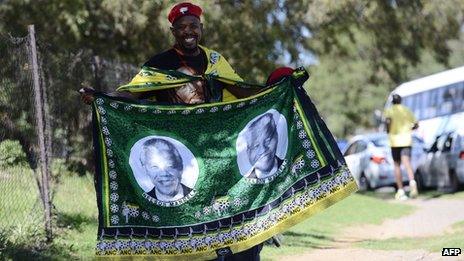
Vendors hope for good sales from the more than 4,000 ANC delegates
But Mr Habib says Mr Ramaphosa, who sits on a number of boards and has interests in embattled mining company Lonmin, will have to prove to some parts of society that he is the right man for the job.
"I'm not convinced that he is the answer to the problems of the poor," he says.
"I struggle to understand how someone who is part of the ANC NEC [national executive committee] can sit by while workers are subjected to appalling living and working conditions in a company he has interests in."
However, this is the man Mr Zuma has chosen to share power with and he will have to help him unify a divided ANC.
Mr Zuma has a mammoth task ahead - sentiment, charm and sympathy will only get him so far.
Many, even those loyal to him, need to see an end to poverty, crippling corruption and inequality.
Class divisions are also becoming sharper in the ANC. At the conference, which ends on Thursday, it is easy to spot the haves from the have-nots with the majority arriving in buses and a handful of delegates in luxurious BMWs, Porches and Range Rovers.
Mr Habib warns that such inequality will spell disaster for the party one day.
"In less than 20 years this country will burn if the gross inequalities in our society are not addressed.
"Mr Zuma has the capacity to do this but he has not shown that he has the political will to do so."
- Published6 April 2018
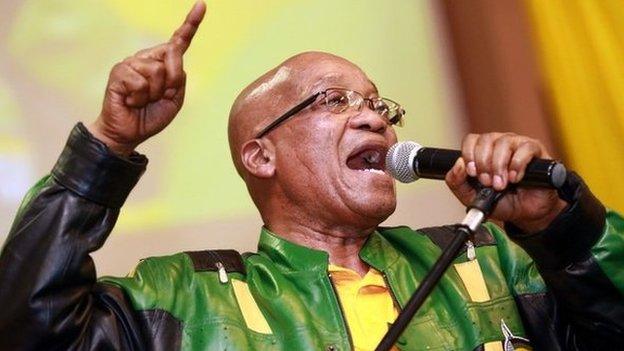
- Published17 June 2024
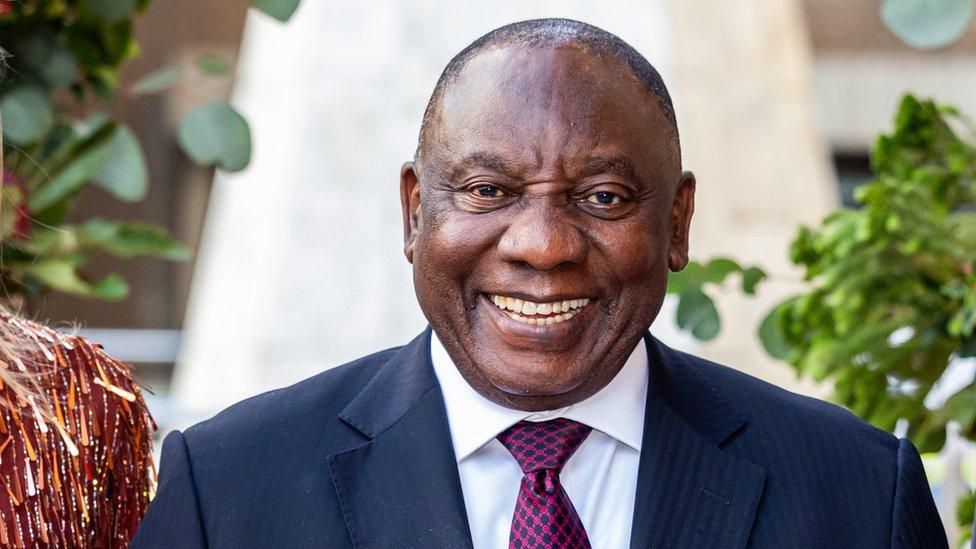
- Published14 December 2012
- Published13 December 2012
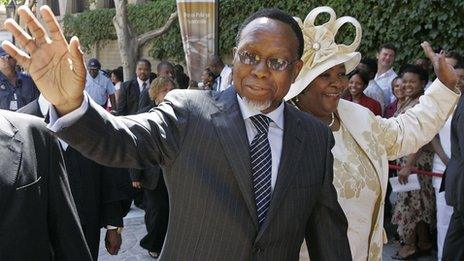
- Published15 December 2012
- Published9 July 2024
